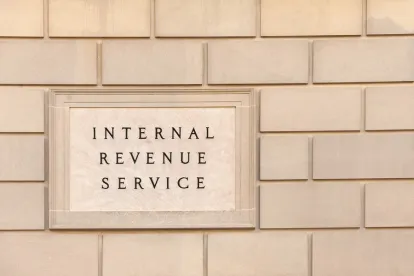On June 19, 2020, the Internal Revenue Service (IRS) issued Notice 2020-50 (the Notice) to provide guidance on coronavirus-related distributions, increased plan loan limits, and deferment of plan loan repayments allowed pursuant to the Coronavirus Aid, Relief, and Economic Security (CARES) Act. The Notice provides further guidance for retirement plan sponsors on implementing changes under the CARES Act provision, and supplements prior IRS guidance issued in the form of FAQs, as discussed in a prior post.
Key elements of the Notice include:
-
An Expanded Definition of “Qualified Individual”
Under the CARES Act, coronavirus-related distributions, the increased plan loan limits, and the deferral of plan loan repayments are available only to “qualified individuals.” A “qualified individual” is someone who has been diagnosed with the virus SARS-CoV-2 or the coronavirus disease 2019 (each referred to herein as “COVID-19”); whose spouse or dependent has been diagnosed with COVID-19; or who experiences adverse financial consequences stemming from COVID-19 as a result of being quarantined, furloughed, laid off, having reduced work hours, being unable to work due to lack of child care, the closing or reduction of hours of a business owned or operated by the individual, or other factors as determined by the Department of the Treasury.
In the Notice, the IRS exercises this authority and expands the definition of “qualified individual” to include an individual who experiences adverse financial consequences as a result of one or more of the following:
-
Having a reduction in pay (or self-employment income) due to COVID-19
-
Having a job offer rescinded or a start date for a job delayed due to COVID-19
-
The individual’s spouse or member of the individual’s household being (1) quarantined, furloughed, laid off, or having work hours reduced due to COVID-19; (2) being unable to work due to lack of childcare due to COVID-19; (3) having a reduction in pay (or self-employment income) due to COVID-19; or (4) having a job offer rescinded or start date for a job delayed due to COVID-19
-
The closure or reduction of hours of a business owned or operated by the individual’s spouse or a member of the individual’s household due to COVID-19.
A “member of the individual’s household” means someone who shares the individual’s principal residence.
NOTE: This broadens the already expansive definition of qualified individual, and allows a greater number of plan participants to benefit from the favorable tax treatment of a coronavirus-related distribution (discussed in more detail in our earlier alert).
-
-
Clarification of Rules Allowing Reliance on Self-Certification of “Qualified Individual” Status
The Notice also resolves an open issue about whether a plan administrator may rely on an individual’s self-certification that he or she is a “qualified individual” for purposes of the expanded plan loan provisions. The CARES Act and earlier FAQ guidance allowed plan administrators to rely on self-certification, but only for coronavirus-related distributions. The Notice makes it clear that plan administrators may rely on self-certification for purposes of the plan loan changes as well. In both instances, reliance on an individual’s self-certification is permitted if the administrator does not have actual knowledge that is contrary to that certification. For purposes of this standard, a plan administrator is not obligated to inquire into whether the individual has satisfied the conditions to be a “qualified individual.” The Notice also includes a sample certification.
-
Clarification that CARES Act Changes Are Optional
The Notice clarifies that retirement plan sponsors are not required to allow coronavirus-related distributions, increase the plan loan limits, or suspend plan loan repayments. These changes are optional, and plan administrators may develop any reasonable procedures for identifying which distributions are treated as coronavirus-related distributions under its retirement plans, provided the plan is consistent in its treatment of similar distributions.
Regardless of whether a plan is amended to allow coronavirus-related distributions, a qualified individual may obtain favorable tax treatment by treating a distribution that would otherwise satisfy the CARES Act requirements as a coronavirus-related distribution on his or her federal income tax return.
-
A Safe Harbor for Administration of Suspended Loan Payments
The CARES Act includes a rule under which the due date for repayments on a qualified individual’s outstanding plan loan that would otherwise be due during the period beginning March 27, 2020, and ending on December 31, 2020, may be delayed for one year. Subsequent loan repayments are required to be adjusted to reflect the delay and any interest accruing during the delay, and the period of the delay is disregarded in determining the five-year maximum repayment period.
Prior to the Notice, there were a number of open questions related to administration of this provision and re-amortization of repayments otherwise due during the suspension period. The Notice establishes a safe harbor that is available when a qualified individual’s obligation to repay a plan loan is suspended for any period beginning March 27, 2020, and ending not later than December 31, 2020 (the “suspension period”), provided: (1) the loan repayments resume after the end of the suspension period; (2) interest accruing during the suspension period is added to the remaining principal of the loan; and (3) the loan is re-amortized and repaid in substantially level installments over the remaining period of the loan (which may be extended by up to one year from the date the loan was originally due to be repaid). If a plan administrator satisfies the safe harbor, the plan is treated as complying with the applicable requirements of section 72(p) of the Internal Revenue Code of 1984, as amended (the Code). Compliance with the safe harbor is not required, however, and the Notice acknowledges that there may be other, reasonable ways to administer this provision in the CARES Act.
NOTE: This safe harbor for re-amortization of suspended repayments is substantially similar to the relief the IRS provided following Hurricane Katrina and the similar loan rules established in the Katrina Emergency Tax Relief Act of 2005. This guidance is welcome relief for plans and administrators who hoped the IRS guidance would align with past administrative practices.
In addition to the changes listed above, the Notice provides guidance on a number of other aspects of coronavirus-related distributions, including: tax reporting by plans and individuals; the types of distributions that can and cannot be designated as a coronavirus-related distribution; the types of distributions that may be recontributed to a retirement plan or IRA; accepting recontributions; special tax notice and mandatory/optional withholding requirements; and the $100,000 total distribution limit.
Along with the guidance on the CARES Act, the Notice also briefly addresses nonqualified deferred compensation plans. The Notice permits the cancellation of a service provider’s deferral election under such a plan when the service provider receives a distribution from a retirement plan that constitutes a coronavirus-related distribution by deeming such a distribution a hardship distribution for purposes of existing regulations under Code section 409A. Note that it is required that the deferral election be cancelled; it cannot be delayed.





 />i
/>i

